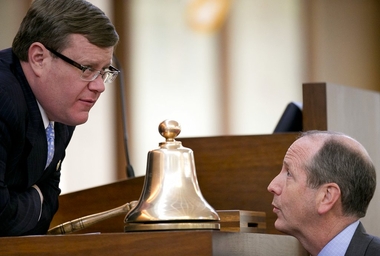North Carolina 'bathroom bill' saga lingers in election year

RALEIGH, N.C. (AP) — North Carolina is again an attractive location for big out-of-state corporations. The state no longer sits squarely in the crosshairs of culture wars over transgender rights. College basketball tournament games are back, after a one-year hiatus.
But the saga of the state's so-called bathroom bill hasn't been forgotten, and many Republican incumbents who passed House Bill 2 in 2016 are being targeted this election year, with the flap over the law still an issue.
In a compromise reached a year ago this week, Democratic Gov. Roy Cooper and the Republican-controlled General Assembly approved a partial repeal of HB 2, which did enough to remove the issue from national newscasts, to the relief of people from all sides.
"The issue is behind us in a lot of ways," said Bob Orr, a former state Supreme Court justice. "I'm just glad that's one less unpleasant issue that people are talking about."
But Democrats seeking to retake control of the legislature — along with at least one Republican primary challenger — hope to benefit from anger over the law and its aftermath. The situation adds to the GOP's challenges in districts where Democrats are already energized in opposition to President Donald Trump and unhappy with state Republican policies on taxes, school choice expansion and the environment.
"HB 2 was a very dangerous bill, and it got my attention," said Democrat Marcia Morgan, a lesbian and first-time candidate running this fall for the Wilmington-area House seat held by Republican Rep. Ted Davis.
One of HB 2's chief sponsors, Sen. Dan Bishop of Charlotte, faces a GOP primary in early May against Beth Monaghan of Charlotte, who has a gay son.
Bishop "abandoned Republican values" of limited government, individual dignity and equal rights, said Monaghan. "I just have too much pride in my state of North Carolina to not do something about this senator."
Unseating Bishop would be difficult in the GOP-leaning district encompassing south Charlotte and bedroom communities outside North Carolina's largest city. He was a longtime county commissioner and has a big campaign cash advantage. In an interview, Bishop said he can't imagine Republicans in his district will be interested in "that unpleasant controversy that has been put to rest."
Bishop said he plans to focus his campaign on the GOP's tax cuts, controlled spending and the state's improved business climate. While HB 2 "is dwelled upon by my primary opponent," Bishop said, "I'm not hearing that as the top thing on people's minds."
But Democrats believe Bishop and many other Republicans in competitive districts with plenty of independent voters are vulnerable because of what the law did and its perception as discriminatory.
Republicans said HB 2 gave privacy and protection to children using restrooms and locker rooms. The law said transgender people had to use public bathrooms corresponding to their birth certificates, and barred non-discrimination ordinances by all local governments.
A national backlash affected thousands of jobs as concerts and conventions were canceled. The NCAA moved sports championships out of North Carolina, and the 2017 NBA All-Star Game set for Charlotte went elsewhere, although it's now returning in 2019.
"In especially urban and suburban areas ... what HB 2 did is kill the Republican brand," said Morgan Jackson, a political consultant for Cooper and state Democrats' legislative races. "It is still a very salient issue with swing voters."
HB 2 and its aftermath are particularly sensitive to Charlotte. The law got passed in March 2016 response to the Charlotte City Council approving an ordinance expanding its antidiscrimination protections to LGBT people using public accommodations. It was GOP Gov. Pat McCrory, a former mayor of Charlotte, who signed it into law.
McCrory and Democrat Jennifer Roberts, the mayor at the time the ordinance was passed, both paid a price.
McCrory narrowly lost his re-election bid in 2016 to Cooper, who made HB 2 a big issue. Gay rights groups also spent money and time seeking McCrory's defeat. Then last fall, Roberts lost in the Democratic mayoral primary, despite her support from state and national LGBT organizations.
"The two biggest public faces of it are no longer with us — the mayor and the governor," said state GOP Executive Director Dallas Woodhouse, who downplays the role of HB 2 this year. Voters, he said, "were sick seeing it on TV every night. So now that it's gone away, they want it to stay away."
Still, a lot is riding on these elections. The partial repeal said local governments can resume enacting new ordinances expanding LGBT protections for public accommodations in December 2020.
Republicans could delay that date if they keep veto-proof majorities. But if Democrats win six more Senate seats or four more House seats to end the GOP's super-majorities — or take even more seats, regaining control of both chambers, they might be able to revisit the issue in their favor.
Gay rights groups didn't like the repeal bill because it still barred local governments from expanding protections for transgender people.
Matt Hirschy, interim executive director of Equality North Carolina, said he sees more impassioned candidates than ever on the subject of advancing LGBT rights. But he acknowledges the public's malaise over the "bathroom bill" requires a different strategy than just attacking HB 2.
"There's a lot of general fatigue about the word 'bathroom,'" he said.
Copyright Associated Press, all rights reserved.
The Gayly. March 30, 2018. 9:57 a.m. CST.





